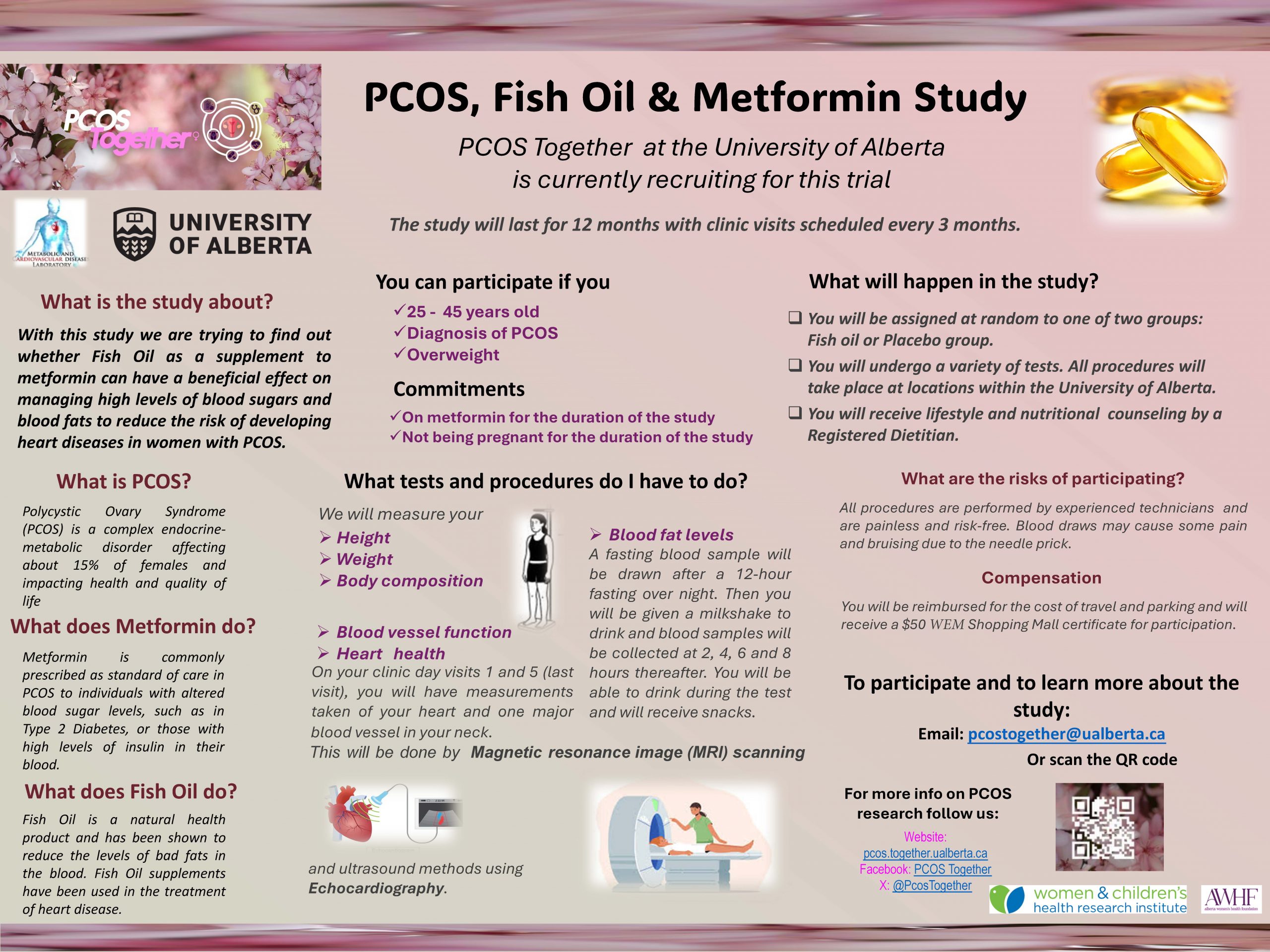We Are Now Recruiting for this Study!
Background
Globally and in Canada, the incidence of polycystic ovary syndrome (PCOS) is 10-15% of women of reproductive age, and women with PCOS have a 2-fold higher incidence of cardiovascular disease (CVD). PCOS is a metabolic-endocrine disorder associated with increased testosterone levels, menstrual dysfunction, infertility and the metabolic syndrome. Our overall goal is to provide evidence-based research that can directly impact Canadian and International guidelines for the assessment, therapeutic management and primary prevention of atherogenic dyslipidemia and early CVD in women with PCOS. The significance of this project is that we currently lack evidence-based research for effective and safe treatments that target atherogenic dyslipidemia and premature CVD in young women with PCOS.
Our preliminary data shows Canadian women with PCOS have 2-fold the incidence of CVD, dyslipidemia, early atherosclerotic CVD and cardiac dysfunction. These women have twice the incidence of carotid artery plaques, increased carotid intimal medial thickening (cIMT) and altered left ventricular global longitudinal strain (LVGLS). We have been the first to show that young women with PCOS have increased plasma apolipoprotein (apo) B-remnant cholesterol and triglycerides (TG). ApoB-remnant cholesterol is a primary cause of atherosclerotic CVD. Fasting and non-fasting plasma apoB-remnant cholesterol is associated with increased cIMT and end-stage ischemic CVD events. Our pilot data has shown fish oil (FO), as an adjunct therapy to standard of care metformin for treatment of insulin resistance, has efficacy to reduce plasma apoB-remnant cholesterol and TG in young women with PCOS. Our FO-metformin clinical trial protocol was approved by Health Canada and provides proof of principle for the potential efficacy to reduce the progression of early CVD in high-risk women with PCOS.
These pilot findings form the rationale for this proposal to investigate the long- term efficacy of FO, as an adjunct therapy to standard of care metformin, to reduce progression of cIMT in association with improvements in atherogenic apoB-remnant cholesterol, and cardiac and endothelial function in high-risk young women with PCOS.
Aims
Overall Objective and Hypothesis: The overall objective of this project is to conduct a long-term trial to determine the effect of FO as an adjunct therapy to standard of care metformin on the progression of atherosclerotic CVD and the association with improvements in apoB-remnant cholesterol, and effects on cardiac and endothelial function in high-risk young women with PCOS. Our overall working hypothesis is that the addition of FO to standard of care treatment with metformin will reduce progression of atherosclerotic CVD and this will be associated with a reduction in apoB-remnant cholesterol, and improvements in cardiac-endothelial function in high-risk young women with PCOS. We will conduct a randomized double-blind placebo controlled trial in PCOS women aged 25-45yrs. We will measure the primary outcome of cIMT, secondary outcomes of apoB-remnant cholesterol and tertiary outcomes of cardiac and endothelial function at baseline and post-intervention following metformin treatment with or without high-dose FO for 12 months.
Primary Objectives
I) To determine the effect of FO as an adjunct therapy to standard of care metformin on the progression of cIMT in high-risk young women with PCOS. We will use high resolution two dimensional ultrasound imaging to determine the progression of cIMT as a surrogate marker of early atherosclerosis.
II) To determine the association of plasma apoB-remnant cholesterol with the progression of cIMT following FO intervention as an adjunct therapy to standard of care metformin. ApoB-remnant cholesterol, inclusive of fasting and non- fasting apoB48 and apoB100-lipoprotein remnants, will be measured using our established Western Blot methods. We will use a multiple linear regression model to assess the relationship between the progression of cIMT with plasma apoB-remnant cholesterol.
III) To determine the effect of FO as an adjunct therapy to metformin on cardiac and arterial endothelial function. We will use highly-sensitive ultrasound and 2D-Speckled Tracking Echocardiography methods to measure LVGLS and endothelial function using brachial artery flow mediated dilatation.
Significant Impact
We urgently need research to investigate effective and safe approaches to manage atherogenic dyslipidemia and prevent early CVD in this population of high-risk young women with PCOS. We anticipate the results will show that long-term intervention of FO+metformin compared to standard of care metformin alone will reduce progression of early CVD in high-risk young women with PCOS.


